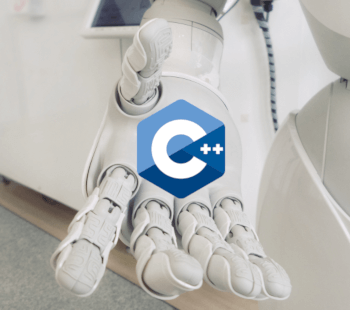Machine learning (ML) and artificial intelligence (AI) are rapidly growing fields, and many programmers, developers and companies are turning to the power and flexibility of the C++ programming language to build robust and efficient ML and AI systems.
In this article, we’ll explore some of the key concepts of machine learning and AI with C++, highlight some of the libraries and frameworks that are available and explore how this language can be used in developing intelligent systems.
Understanding Machine Learning and AI
Machine learning is a type of AI that involves using algorithms to identify patterns in data and learn from them without being explicitly programmed. It is based on the concept that machines can learn from data, identify patterns, and make predictions or decisions based on those patterns. Machine learning algorithms are categorized into three types: supervised learning, unsupervised learning, and reinforcement learning.
Supervised learning involves training a machine learning model on a labeled dataset, where the input data is labeled with the expected output. The goal is to teach the model to predict the output for new input data accurately. Unsupervised learning, on the other hand, involves training a model on an unlabeled dataset, where the goal is to identify patterns and structures in the data. Reinforcement learning involves training a model to make decisions based on rewards and punishments.
AI refers to the ability of machines to perform tasks that usually require human intelligence, such as visual perception, speech recognition, decision-making, and language translation. AI systems can be rule-based, where they follow a set of predetermined rules, or they can be machine learning-based, where they learn from data.
Why Machine Learning
There are many areas where ML has started to play an important role. It is used for solving enterprise business tasks as well as for scientific research. In customer relationship management (CRM) systems, ML models are used to analyze sales team activity, to help them to process the most important requests first. ML models are used in business intelligence (BI) and analytics to find essential data points, such as in customer segmentation and churn prevention. Health care applications include early diagnosis and microarray analysis. Machine learning can be used in engineering for performance optimization and predictive maintenance. Human resource (HR) departments use ML models to analyze their employees’ characteristics in order to identify the most effective ones and use this information when searching applicants for open positions.
How C++ is Used in Machine Learning
C++ is a powerful and versatile programming language that is well-suited to building large-scale, high-performance systems. As a result, it has become a popular choice for machine learning and artificial intelligence development, particularly in areas where performance and scalability are critical.
C++ can make your ML models run faster and more efficiently compared to other approaches that use interpreted languages, such as Python. Also, C++ allows you to significantly reduce the negative performance impact of data conversion between different languages used in the ML model because you have direct access to core algorithms and raw data.
Another key advantage of using C++ in machine learning is its ability to interface with other languages and libraries. For example, many machine learning libraries and frameworks are written in Python, which is a popular language for data science and machine learning. C++ can be used to write high-performance components that interface with Python libraries, allowing developers to take advantage of the performance benefits of C++ while still using the familiar Python ecosystem.
Using C++ for Machine Learning and AI
C++ is a popular programming language for building high-performance systems, and it has been used in the development of many machine learning and AI applications. Here are some reasons why C++ is suitable for developing intelligent systems:
-
High Performance: C++ is a compiled language that offers excellent performance, making it suitable for building systems that require high computational power.
-
Low-level control: C++ provides low-level control over hardware, making it easier to optimize performance and memory usage.
-
Efficient and scalable: C++ is well-suited to building low-level components of machine learning systems, such as data structures and algorithms. Many machine learning algorithms rely on complex mathematical operations, such as matrix multiplication and linear algebra. C++ is a language that is well-suited to implementing these kinds of operations in an efficient and scalable way.
-
Portability: C++ is a portable language that can run on different platforms, making it easy to deploy applications to different environments.
-
Rich set of libraries: C++ has a rich set of libraries and frameworks that can be used for machine learning and AI.
C++ Libraries for Machine Learning and AI
C++ has a wide range of libraries that can be used for machine learning and AI. These libraries provide pre-implemented algorithms, functions, and tools that can be used to build intelligent systems. Here are some of the popular libraries for machine learning and AI with C++:
-
TensorFlow: A powerful machine learning framework that was originally developed by Google. It supports a great selection of machine learning algorithms, and is designed to be highly scalable and flexible. It can be used to build a variety of models, including neural networks, decision trees, and support vector machines.
-
OpenCV: An open-source computer vision library that provides tools and algorithms for image and video processing. It includes functions and algorithms for tasks such as face detection, object recognition, and image segmentation as well as several machine learning algorithms that support vector machines and k-nearest neighbors.
-
OpenNN: An open-source neural networks library written in C++ for machine learning and advanced analytics. It solves many real-world applications in energy, marketing, health, and more.
-
Dlib: A modern C++ toolkit containing machine learning algorithms and tools for creating complex software in C++ to solve real world problems. Algorithms include classification, regression, and clustering. It has tools that support deep learning, computer vision, natural language processing, image and video processing and facial landmark detection.
-
MLPack: A ML library that aims to provide fast, extensible implementations of cutting-edge machine learning algorithms including clustering, regression, and dimensionality reduction. It also provides tools for data preprocessing and visualization.
-
Shark: A fast, modular, feature-rich open-source C++ machine learning library that provides methods for linear and nonlinear optimization, kernel-based learning algorithms, neural networks, and various other machine learning techniques.
-
Caffe: A deep learning framework developed by the Berkeley Vision and Learning Center. It is designed for efficient implementation of convolutional neural networks (CNNs) and other deep learning models. It’s focused on image and video analysis. Optimized for GPU-based computation, it’s well-suited to building large-scale neural networks.
Conclusion
Machine learning and AI are rapidly growing fields with many applications in industry, medicine, finance, and more. C++ is a powerful and flexible programming language that is well-suited for developing machine learning applications due to its speed, efficiency, and low-level control. With a variety of libraries and frameworks available, C++ provides a solid foundation for building complex machine learning models and applications.
Contact us to learn more about implementing a high performance artificial intelligence and machine learning system in C++ for your business.



